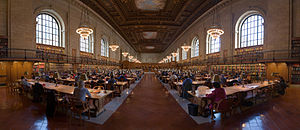There’s nothing like it. Bukowski really nailed it when he wrote about it. It’s my second day here at the Saratoga Public library doing some work and it’s overflowing with joy for me.
I’m in Saratoga Springs with my partner as she is here attending a state teacher’s meeting. I tagged along for support, good dinners, to fetch coffee from time to time, and to enjoy a new town together. But when she is in meetings, I have to find something to do. The public library is always a good choice, wherever you are.

The Saratoga Public Library on November 3, 2024
I like writing and working from home but this comes with a test of willpower: Can you stay seated, typing and reading, for a long enough time to get a boil going and then for the boil to actually cook anything properly? Chances are, no. There are myriad things to attend to at home such as cleaning, supplying the house, taking care of a whiny little dog, and various other chores. For example, today I spent a long time on the internet and the phone making doctor’s appointments (or trying to). This wasn’t the case when you are out of pocket and in a space reserved for a very specific kind of work – the work of words.
Charles Bukowski said it best about the library. For him it was a respite from the continuous torture he faced from his parents and from the other students at school. He would often skip and go to the public library instead where he would read a lot of the works that would inspire him to become one of the greats himself. He wrote a couple of odes to the library:
When I was dying of hunger and nobody wanted to publish me, I spent even more time in the library than I have ever since. It was wonderful to get a seat by a window in the sunlight where the sun could fill my head with music. (1965)
and from a poem “The Burning of the Dream” about the destruction of the library that saved him during high school:
it is
thanks to my luck
and my way
that this library was
there when I was
young and looking to
hold on to
something
when there seemed very
little about
The relationship with the library is a layered thing. It was for me a place to find fun books on a weekend, then it became a weapons plant – something like Q’s lab when James Bond is being equipped for a mission. Many summers I would be asked to be dropped at the public library in Lakeland, Florida when visiting my Dad. There wasn’t a lot to do that interested me so being there was great. I could read and listen to CDs. They had quite the collection. I could also just look at whatever book caught my attention.
High School debate brought about the weapons lab, where the library was transformed into a place to sharpen iron and learn new spells to cast against one’s opponents. A grimoire of potential magic words for debate became a place to then write my own, drawing from it to create depth and flow for my own writing from high school to college. Since graduate school to today, the library is the place I go first when crafting ideas. I draw as many books as I can from it and then see where they can take my words. So far, so good. I’ve written a lot, and I’ve written many things that I think people like. Although I haven’t really written anything that is at the level of moving attitude and feeling that I would like.
Practice with writing is essential and I don’t do it as often as needed. Finding a space to dedicate to it is hard. I think I’ll try my own library now that I’m home from my fun trip up north. Working in your own space is a bit more challenging as there are distractions galore and priorities that can easily dethrone the practice of writing. Trying to draw upon old books to find new ways to say (or cast) the magic words about takes energy and time, two things that capitalism does not like to share. You should be consuming! That consumption shouldn’t inspire you to create, but to consume more! It’s a formidable foe.
Tomorrow will be a trip to a new library to me to donate books. Even this can be a distraction from writing. Reading can be a distraction, although a significant amount of reading is needed to be able to write anything decent. The energy for this art is enormous. And we think AI drains energy. Think about how much you are fighting against to write just one simple paper for a class. Your mind wants to think about a ton of other things. You feel anxious about all the other things that need attention. And also, what are you trying to say? What do you want to say? What does the paper want to be? What does the audience (aka the teacher) want the paper to be?
It’s a lot and too much at once. One thing at a time. A place and a means and a mode are what are needed for practice. And the writing will never be very good. But it will be done and contribute to a future writing, a future engagement that maybe someone will like.


